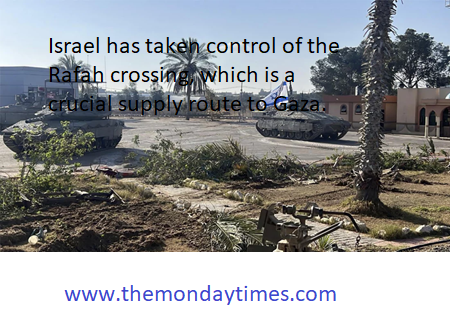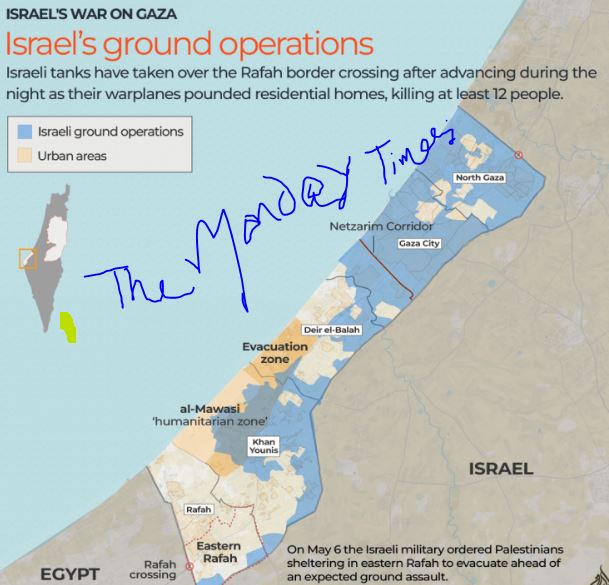
The Israeli military has assumed command of the Rafah crossing, a crucial passage from Gaza to Egypt, as they have declined to agree on a ceasefire. Israel’s 401st Armored Brigade blocked off the Salah-al-Din crossing in eastern Rafah on the morning of Tuesday, April 7th, following an overnight operation.
An Israeli military official has confirmed that they have taken operational control of the Rafah crossing area and stationed special forces there. The official further stated that the special forces are currently scanning the crossing and that it is expected to be reopened within the next few hours. In addition, the Israeli military has conducted ground troops and airstrikes targeting suspected Hamas positions.
The Rafah crossing is located at the southern border of the Gaza Strip, with Gaza on one side and Egypt’s Sinai Peninsula on the other. This crossing is crucial for the Palestinians living in Gaza as it serves as a lifeline, allowing supplies of food, medicine, fuel, and other necessities to enter the region.
Recently, Israeli troops have occupied the crossing, but there has been no confirmation on how long they will stay.
Pictures released by the Israeli military show tanks entering the crossing, with Israeli flags flying from them.
Reports from Palestinian health officials suggest that Israeli forces destroyed several neighborhoods and homes in Rafah city overnight, with tanks and airstrikes. The attacks resulted in the deaths of at least 20 Palestinians, while several others were wounded.
Hisham Edwan, a spokesman for the Gaza border crossing, has warned that if the Rafah border crossing is closed, the residents of Gaza will have no choice but to face death. This crossing is the only way into the besieged city of Rafah and Egypt, and relief aid reaches Gaza through this crossing.
Since the beginning of the war, Israel has taken full control of all access routes into and out of Gaza.
Hamas has agreed to a ceasefire proposal, but Israel has rejected it, stating that it does not meet their conditions. As a result, Israel has launched a new campaign in Rafah city.
Despite international calls to halt the attacks, Prime Minister Benjamin Netanyahu has authorized the operation in Rafah town. The region has over 1 million refugees from the Gaza Strip, with some residents already evacuated from certain areas of Rafah city on Monday.

Trapped
Tareq Abu Azzoum reported from Rafah that the Israeli military conducted an incursion on the eastern side of Rafah. During this operation, there was a heavy exchange of fire with Hamas fighters amid an intense bombing campaign. The primary objective of this incursion was to seize control of the crossing. The Israeli control of the border post is devastating for the Palestinians, who will no longer be able to leave the territory.
Despite urgent warnings from its closest allies that an offensive on the city risks a huge number of civilian casualties, Israel insists that its plans will allow it to clear Rafah and press on to attack the Hamas command and fighters there. The Rafah offensive has resumed, although the international community, the US, and the European Union member states have requested Netanyahu not to attack. Josep Borrell, the EU’s top diplomat, told journalists on Tuesday that he is afraid that this offensive will cause a lot of civilian casualties. He added, “There are no safe zones in Gaza”.
Israeli forces ordered the evacuation of 1.4 million Palestinians from Rafah, many of whom are displaced due to previous Israeli military instructions, causing panic on Monday.
However, people sheltering in Rafah, amid poor conditions with little shelter, food, or medicine, have few places to go.